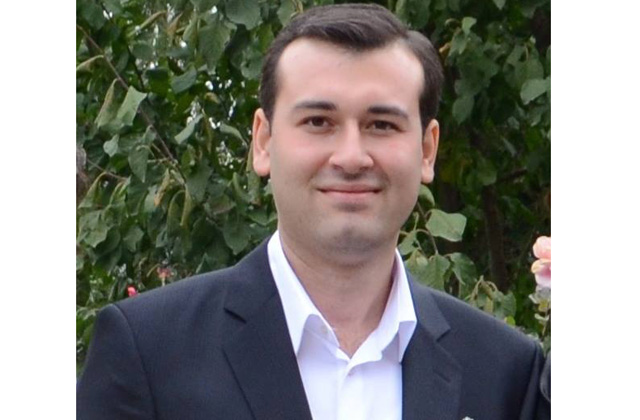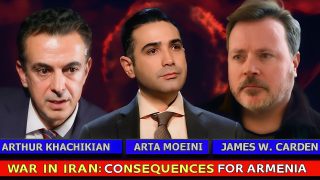“Clash with Azerbaijan is Inevitable”

Interview with Eduard Abrahamyan, expert on NATO strategy, intelligence, security and strategy researcher at the Leicester University (United Kingdom), fellow at Policy Forum Armenia, based in Washington, DC.
Aliyev-Sargsyan meeting was held in Vienna, after which the Co-chairs, RA presidential office appeared with statements providing minimum information on subject of negotiations. However, supposedly, subject of negotiations was security mechanisms, on some of which Azerbaijani authorities are expressing unclear dispositions. In your opinion, what happened in Vienna, what will its implication be?
After the April four-day war Azerbaijan came out with tactical war, which was conditioned by attack unexpected for the Armenian side, during which the Azerbaijani side tested both strength of Armenia’s defense and capabilities of acting adequately. Baku also tested the reflection of the international community—new and wider-scale, at the same time, to develop short-term military operations in visible future.
On the whole it came out with a tactical victory, unpunished, and moreover, Baku in Vienna simply recorded not so big, but a strategic, operatively crucial territorial acquisition, which was of great internal propaganda and psychological importance for Aliyev. The snapshot would be quite different, when the Armenian side claimed not only the 1994-1995 ceasefire agreement, but also pre-April restoration of operative condition on the Line of Contact, which didn’t occur. Moreover, it became known that agreements reached in Kazan in 2011 are taken as a basis, which plans phase-to-phase settlement, and as Serzh Sargsyan has already stated he’s ready to withdraw the five regions, then Vienna meeting may generate serious implications for the Armenian side in near future.
According to RF Foreign Minister Lavrov settlement will bear phase-to-phase character, which means Azerbaijan in the meeting scheduled in June may demand clear timetable, when the Armenian side will start the process of returning those five regions. Western expert circles managed to notice that Armenia’s political establishment is not quick to orientate.
Moreover, the Armenian side has set an issue to return pre-April regional political order. However, it’s becoming a serious dangerous imitation for Armenia, as return to former reality is no more possible. Quite a different situation has been established—a pre-war one. The point is that present-day international developments and dynamics are not those of 1994 or 2005. Everything is changing.
Risks and threats are increasing, Russia-West relations are more sharpening, situation in southwestern Asia around China is escalating as well, the Middle East has completely changed as a result of war against Syrian groups. Former social system—the dynamics of post-cold war international relations doesn’t exist anymore, and the new one with its game rule hasn’t developed yet. Thus, despite Armenia’s authorities prefer or not, they faced radically new reality, which, in its turn, has brought new rules—rules of a lasting war, which is currently gradually appearing in the whole world.
Against the background of Russia-West confrontation how did Vienna meeting reflect positions of the West and Russia in Karabakh conflict, i.e. should it be claimed that the West failed Russian plans or not?
Russia and the West are approaching to geo-political and regional conflict culmination period, which tends to more sharpen the situation by rising threats for military accidents of yet local confrontation, which, probably, will more deepen the crisis between these two poles. In this complicated reality the USA and Russia formally are partners within Minsk Group, and if it’s maintained, it’ll become one of Russia-USA confrontation platforms.
At least the logic of Russia’s active engagement throughout the four-day war and after it, and counter steps by the USA edify this. As for failure of the Russian plan by the USA, it’ll be more proper introducing it in other way. Russia would like to control the conflict, and use the conflict and Artsakh, as a tool to maintain control over Armenia and Azerbaijan. It’s clear, military presence would be preferable in the form of the so-called peacekeepers, however, the most important precondition for deploying a peacekeeping mission is instability and war with disastrous implications for locals. Such a situation lacks, and Moscow has to wait for new military operations.
However, it should be taken into account that the new war itself doesn’t promise beneficial conditions for strengthening of Russian influence, as implications of new clash may have a contrary effects, at least for the reason that due to the conflict with the West Russia’s forces are being more and more consumed.
What’s your assessment to the steps by Armenia’s authorities on sitting at the negotiation table, dismissing of officials, freezing of NK recognition draft law, unexpected statements on fighting against corruption and vicious phenomena and all recent steps?
Sitting at the negotiation table came from avoiding war, of the so-called American logic. However, first and foremost, it showed that in some sense Armenia withdrew from the three conditions put forward by RA president Serzh Sargsyan and by his own position adopted in Vienna enshrined those 800 hectares behind Azerbaijan.
This didn’t mean avoiding new, larger war, as, in fact, it had the contrary effect. Moreover, the Armenian side stated that it’s ready to retreat territories, and stated this after the April developments, when the logic should dictate adoption of quite the contrary policy. All this made Azerbaijan more confident diplomatically and established a conviction that the issue of resumption or non-resumption of military operations depends on caprice of Azerbaijan’s geo-political authorities and on conditions more favorable for them.
Thus, it would be proper to fundamentally change political and diplomatic logic of Karabakh issue after the April developments, centralizing on the process of legally joining Artsakh with its current borders to Armenia. You’ll say this will increase the risk of war. However, we should realize that after 1994 many things have changed, there is no Artsakh issue, but there is Armenia-Azerbaijan regional, and why not—already global competition, where Karabakh issue is one of the platforms of that contestation, and the war—one of natural and logical tools of contestation.
So, if we show academic approach to this contestation, it can be considered accomplished in case, when one of the sides will be left from contestation, in fact, accepting the leading position of its contestant militarily. The winner in contestation will gain certain functions of the dominant in the region, reappearing as a security exporter in the region, in case, when other two nations, with even less ambitions, will be consumers of that security. Thus, withdrawal of territories by Armenia from the perspective of strategic importance of contestation with Azerbaijan will mean defeat with all its implications.
Armenia may come out as a winner from confrontation only due to serious reforms, i.e. through institutional changes, which will boost development and formation of the elite gifted with political-social state mentality.
Just the contrary, in the period of about 23 years serious efforts weren’t invested to come out of political, ideological, global and military contestation with Azerbaijan. It’s necessary to essentially change Armenia’s foreign policy logic, which is inert and non-systemized. Armenia’s neighboring countries have clear ambitions expressed by foreign policy, based on which dynamic foreign policy is implemented by acquiring allies.
About two weeks ago Georgian Defense Minister Khidasheli stated that Georgia doesn’t have strategic relations with Armenia.
Very proper and natural statement. If we ask the same to the Defense Minister of Iran, I’m almost sure we’ll hear the same against the background of Armenia-Iran relations. This means, Armenia has four neighbors, relations with two of which are described as bad, and with the other two, simply “good” or “traditional.” The fact, that Armenia didn’t have allies, is only its guilt. It means, throughout these years there was no enough consistency, probably such an issue wasn’t set as well, such an agenda wasn’t put forward before the foreign office and the Ministry of Defense. Throughout these years it should have been conceptually worked out and understood what regional ambitions may Armenia have, and how it is possible to reach them under evolution of global social system. Out of them—which regional and global functions does Armenia pretend and may potentially pretend?
All this can become a milestone in obtaining allies or strategic partners and use the political resource with them in Armenia-Azerbaijan globalized contestation. There was an impression that Baku realized that Armenia’s political isolation accomplished its initial phase by launching military operations.
It succeeded, the dynamics and the status quo have changed in favor of Azerbaijan. To win, Armenia should hurry. From the contestation standpoint, if observed from “territory for the status” concept is dictated by the logic of international relations of the 1990s, everything has changed now in the world and will more change game rules. Thus, the “territory for the status” concept enshrined both by phase-to-phase and package variants isn’t in line with Armenia’s interests. That concept inevitably raises risks for Armenia and increases war threat under conditions more beneficial for Azerbaijan. Thus, under this new international condition joining Artsakh is unacceptable for Armenia based on international law.
By Araks Martirosyan

























